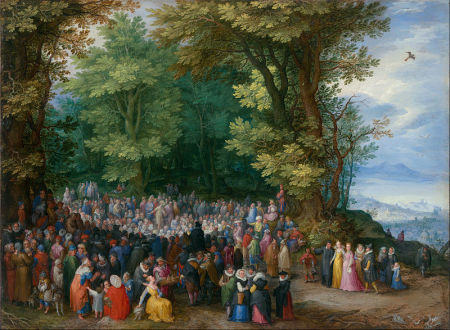Theologian misuses Sermon on the Mount against free-market economy

Like most Christians, Rob Dalrymple has trouble interpreting Jesus’ Sermon on the Mount in the New Testament. In Matthew’s version, Jesus said, “Blessed are the poor in spirit,” while in Luke’s he said, “Blessed are the poor.” There are other differences, but people fixate on those. Most see them as two versions of the same sermon.
One group interprets Luke’s version as meaning the same as Matthew’s, referring to the “poor in spirit.” Another makes both sermons refer to the poor in wealth. Dalrymple follows the latter. However, he isn’t a lay Christian. He earned a PhD in Biblical Studies/Hermeneutics from Westminster Theological Seminary. He created the determinetruth podcast that offers resources on the Bible, culture, and faith, as well as interviews with leading scholars. And he is the lead pastor at Cornerstone Fellowship Church in Brentwood, CA.
Dalrymple wrote recently, “That Jesus was definitely intending to indicate those who were truly poor and not just “poor in spirit” is evident in that Luke notes Jesus’ inaugural speech in the synagogue in Nazareth in which He cites Isaiah 61:1-2 saying, ‘The Spirit of the Lord is upon Me, because He anointed Me to preach the gospel to the poor… (Luke 4:18).’”
Dr. Dalrymple needs to read Jerry Bowyer’s book, The Maker Versus the Takers: What Jesus Really Said About Social Justice and Economics. Bowyer shows that the two passages are not different versions of the same sermon. They are two sermons. The differences in the audiences and locations explain the differences in wording.
The Sermon on the Mount took place in Galilee with an audience of mostly self-employed men and their families. The sermon in Luke is often called the Sermon on the Plain because Jesus preached it while in a plain in Judea where many in the audience were wealthy rulers who had stolen their wealth from the common people, the ones Jesus accused of devouring widows’ houses (Mark 12: 41-44). Judea suffered extreme poverty because the religious and government rulers owned Roman style latifundia, or large estates employing many slaves and absentee owners living in Jerusalem. Jesus blessed the poor and condemned the rich in the Sermon on the Plain because the rich oppressed the people in many ways.
Dalrymple’s description of the economy in Judea is accurate:
“The Roman world and its economy were established in order to maintain the extravagant… lifestyle of the few (most estimates place it as 3% of the population), even though it meant impoverishing the vast majority of the people and enslaving others.”
Then he goes off the rails:
“Now, you might be thinking ‘that was then, but this is now.’ Our contemporary world does not have such blatant injustices. Well, I am not an economist, but an historian. All I can say is that I know of no society in history in which such was not the case. Sure, maybe some societies were ‘worse’ than others. But until we confront the fact that the wealth we experience in America was built on the back of slavery and subjugation of others, I am not sure we are going to get very far in making changes.”
Unfortunately, Dr. Dalrymple is not a good historian. If he were, he would know that things have changed. Until the advent of capitalism, the “honorable” ways to get wealth if you weren’t born to it were through kidnapping for ransom, looting in war, and taking bribes as a government official. All societies despised commerce except for Galileans. The prophets of the Hebrew Bible constantly complained that the princes (the state) perverted justice by bribing judges to steal the land of widows and orphans. Jesus said the Judean leadership committed the same crime. James wrote that they often increased their wealth by withholding the wages of workers (James 5:4).
Church fathers erred by baptizing the economics of pagan philosophers and perpetuating the hatred of commerce in Christianity, so the ancient “honorable” methods of getting rich persisted. Nothing changed until the advent of capitalism in the 17th century Dutch Republic. The Dutch criminalized the ancient “honorable” methods for obtaining wealth and left people with nothing but commerce to do so. But first, they returned to the Bible’s attitude that honest commerce is good and honorable. England and her colonies soon followed the Dutch philosophy.
Since the advent of capitalism, most wealthy people have earned their riches by creating new wealth through innovation instead of stealing it from others. For example, textiles was the leading industry of the industrial revolution. Before it, most people could afford only one suit of clothes because they were too expensive. The industrial revolution reduced the cost of clothing so much that most people could afford several suits of clothes, and many dressed as well as the nobility.
Of course, some continue to steal, for example organized crime. Others “steal” legally by buying politicians and having them pour government money their way or put their people in regulatory agencies to write regulations that favor them. Fed generated inflation is one of the biggest thieves, taking from the poor and giving to the wealthy. In poor countries, the old “honorable” ways of stealing wealth continue to dominate, which is the reason so many countries are stuck in poverty, like Haiti.
As for slavery, Dr. Dalrymple would know if he were a good historian that for most of its history the U.S. confined it to the eleven states of the Confederacy. Cotton, the main product of slavery, made up a tiny portion of the U.S. economy. U.S. living standards rose the most in the period between the Civil War and World War I because of rising productivity in manufacturing and farming because of innovations that created better equipment.
Greece and Rome proved that slavery cannot raise the living standard of a whole nation. It benefits only the slave owners, which have always been a tiny minority. Economists know of no other way to lift people out of poverty than by innovations that raise the productivity of workers. Capitalism has proved it for 300 years.
Many Christians continue to oppose capitalism, which is nothing but Biblical principles of government, because pastors and theologians like Dr. Dalrymple spread false history and economics.
Roger D. McKinney lives in Broken Arrow, OK with his wife, Jeanie. He has three children and six grandchildren. He earned an M.A. in economics from the University of Oklahoma and B.A.s from the University of Tulsa and Baptist Bible College. He has written two books, Financial Bull Riding and God is a Capitalist: Markets from Moses to Marx, and articles for the Affluent Christian Investor, the Foundation for Economic Education, The Mises Institute, the American Institute for Economic Research and Townhall Finance. Previous articles can be found at facebook.com/thechristiancapitalist. He is a conservative Baptist and promoter of the Austrian school of economics.





















